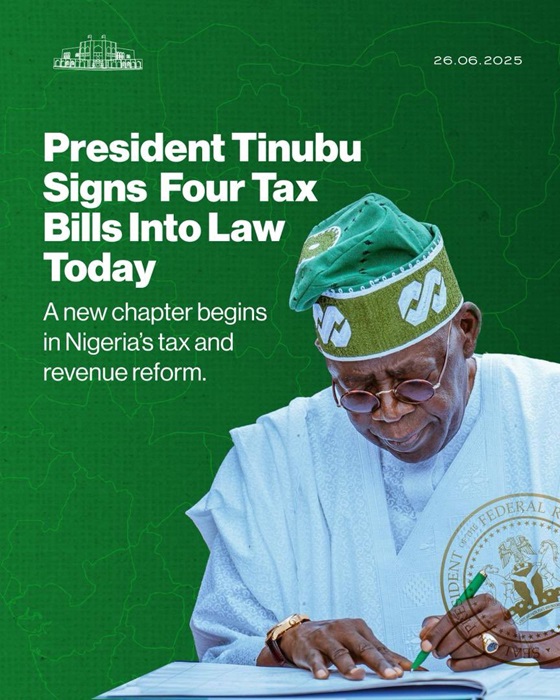Address
T. A. Williams House, Efab Sunshine Estate, House 11, A-Close, 103, Apo - Abuja, Nigeria.
Work Hours
Monday to Friday: 7AM - 5PM


Here is a comprehensive 7-paragraph summary of the new tax reform in Nigeria signed into law in June 2025:
The Nigerian government, under President Bola Tinubu, enacted a sweeping tax reform law in June 2025 aimed at overhauling the country’s outdated and fragmented tax system. The reform consolidated multiple tax statutes into four major laws: the Nigeria Tax Act, the Tax Administration Act, the Revenue Service Act, and the Joint Revenue Board Act. This move marked the first comprehensive restructuring of the tax framework in decades, targeting improved revenue collection, tax equity, and administrative efficiency. The reform is central to the government’s fiscal policy agenda to raise Nigeria’s tax-to-GDP ratio from around 10% to at least 18% by 2026, aligning with global averages.
One of the most significant changes is the restructured Personal Income Tax (PIT) system. The law introduces a progressive tax structure where individuals earning up to ₦800,000 (~$650) annually are fully exempt, relieving millions of low-income Nigerians from the tax net. Higher-income earners face tiered tax rates, with the top bracket capped at 25% for those earning above ₦50 million annually. This structure aims to ease the burden on ordinary citizens while ensuring high earners contribute more. Pensioners and individuals relying solely on government stipends are also exempt under the new rules, reinforcing the pro-poor focus of the reforms.
The reform offers major relief to small and medium-sized enterprises (SMEs), which form the backbone of Nigeria’s economy. Companies with annual turnover not exceeding ₦100 million or asset base below ₦250 million are now exempt from Corporate Income Tax, Capital Gains Tax, and the new Development Levy. For medium and large companies, corporate income tax is being gradually reduced from 30% to 25% over two years. Additionally, qualifying businesses investing in infrastructure, agriculture, or technology may benefit from a 5% tax credit on capital expenditure over a five-year period. These measures aim to promote economic growth, job creation, and private-sector development.
Value-Added Tax (VAT), which remains at 7.5%, has undergone significant structural changes. Essential goods and services such as food, medicine, education, electricity, and rent are now zero-rated, not just exempt—allowing businesses to reclaim input VAT. This reduces cascading tax effects and lowers consumer prices. Moreover, VAT revenue sharing has been revised: the federal government’s share has been cut from 15% to 10%, with 55% now going to states and 35% to local governments. The new allocation formula, based more on consumption origin and population, has sparked concerns among northern states about equity and fiscal balance.
To modernize and unify tax administration, the reform established the Nigeria Revenue Service (NRS), replacing the Federal Inland Revenue Service (FIRS). The NRS is granted greater autonomy, digital infrastructure, and a mandate to enforce unified standards across federal, state, and local levels. A new Joint Revenue Board will coordinate tax policy and enforcement nationwide. In addition, tax filing has moved to digital platforms, with mandatory e-invoicing, electronic VAT reporting, and faster processing timelines. Refunds are now to be processed within 30 days for VAT and 90 days for other taxes, subject to documentation and verification.
Dispute resolution mechanisms have also been improved. A dedicated Tax Appeal Tribunal and an independent Tax Ombudsman have been established to handle taxpayer complaints and resolve disputes more efficiently and transparently. Time limits have been introduced for tax assessments (six years, unless fraud is involved), while a mandatory Tax Identification Number (TIN) system will now be enforced for all Nigerians engaging in taxable transactions. These steps aim to reduce corruption, foster trust, and simplify compliance, especially for businesses navigating multiple layers of tax authorities.
Despite its scope, the reform has not been without controversy. Northern states have criticized the new VAT-sharing formula, which shifts more revenue to states with higher consumption—mostly in the South—raising fears of deepening regional inequality. Economists, however, argue that the new structure incentivizes states to develop their economies and broaden their tax bases. Overall, the 2025 tax reform represents a bold and ambitious step toward building a more sustainable, equitable, and growth-driven fiscal environment in Nigeria. Its success will depend on effective implementation, institutional coordination, and political will across all levels of government.
Would you like this turned into a policy brief, a PowerPoint outline, or translated into another language?
